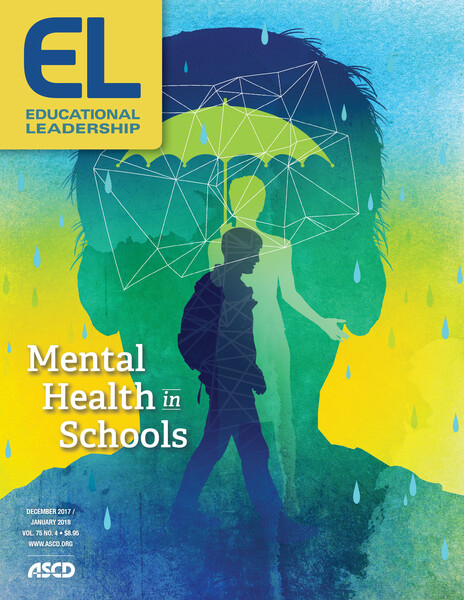The December 2017/January 2018 issue of Educational Leadership looks at the issue of mental health in schools, examining how educators can play a stronger frontline role in identifying potential mental health problems and helping affected students thrive both academically and socially.
The issue reflects the growing awareness that students' emotional and mental health is key to their success in school. In this sense, many of the articles speak directly to ASCD's Whole Child approach to education.
Below are some essential topics and questions to help you reflect on and discuss this issue.
The Professional Development Gap
One theme that runs throughout the issue is the need for better training for teachers and school leaders on mental health issues. In the opening article, teacher Sandy Merz writes of his dawning awareness that conditions like depression and anxiety are increasingly common among the young people he teaches. Yet he has had "zero training in issues related to student mental health." The situation makes him feel ill-prepared as a 21st-century educator.
Merz, who is now working on a professional development primer on student mental health as a part of a Teach to Lead team, outlines several issues that he feels such training must address. These include understanding how mental health issues effect students' work and behavior, how to communicate with students suffering from particular conditions, and what legal and ethical issues are involved in helping students in times of crisis.
In a separate article, Jeffrey Benson writes that teachers working with students with mental illnesses need (among other supports) more opportunities to work with mentors and for clinical consultations with mental health professionals and community agencies.
Questions to consider: Do you agree that teachers need more specialized training in mental health issues to better support today's students? What issues should such training address, and how could it be integrated in your school or district?
What do you think Merz means when he says that training for teachers on student mental health should be designed to help them "become better teachers, not mental health experts or therapist"? Where should the distinction lie?
Dealing with Difficult Issues
Several of the articles in this issue seek to shed light on difficult and sensitive mental health issues that unfortunately affect many students and schools today. These include opioid addiction, self-injury, and suicide.
While the articles address these separate issues in different ways, they all stress the need for teachers and school leaders to learn more about the relevant signs and symptoms, to take steps to open up communication, and to develop targeted schoolwide intervention plans. Such plans should establish protocols and identify go-to personnel and resources, including mental health professionals.
The authors of these pieces also urge educators to work toward de-stigmatizing the behaviors and conditions, while being sensitive to students' needs for privacy and patience. "A student who perceives that the adults in his or her life are being judgmental, dismissive, or invalidating is unlikely to confide in adults in the future," Janis Whitlock and Penelope Hasking write in their article on self-injury. To help increase awareness and understanding, difficult mental health issues like adolescent depression can be integrated into reading discussions or curriculum units.
Questions to consider: Does your school have comprehensive plans to address problems like opioid addiction, self-injury, and suicide (or suicidal depression)? How well do you and your colleagues understand the psychological patterns behind such issues and how they may manifest in school? As an educator, what could you do to raise awareness of these difficult issues and respond more effectively to them in your school?
Trauma in the Classroom
Many educators now recognize the negative impact that trauma can have on students' mental and emotional well-being—including from ongoing stresses in their home lives. Yet, as Kristin Souers writes in her piece in this issue, responding effectively on a daily basis to students experiencing the effects of trauma can be challenging. "We get mired down in the wreckage of the behavior a child is showing—or the bullet point we're trying to cover in the instruction plan," she says. "We quickly lose sight of who we're working with and what we're ultimately trying to achieve."
Souers offers tips to help teachers bring greater awareness of the needs of traumatized students, including identifying the underlying problems particular behaviors might be expressing, remembering that "kids can't learn if they don't feel safe," and operating from a team perspective. More generally, she recommends reflecting on the big picture of what you're trying to achieve as an educator and remembering that "every student deserves to learn, and you're the key to that opportunity."
Other pieces in this issue note that students can also experience trauma or debilitating levels of stress from ongoing racial discrimination or bias, including in the classroom. To help students experiencing racial trauma, educators must gain a better awareness of the prejudice many students of color face in their daily lives and of their own racial assumptions, write Priya Sehgal, Julia Jeffries, and Nancy Rappaport.
Questions to consider: Can you think of a time when you or your school reacted poorly to a student who may have been acting out from trauma or ongoing stress? What could you have done to improve the situation? What challenges did you face? Which of ASCD's Whole Child tenets (healthy, safe, engaged, supported, challenged) are most closely connected to working with students facing trauma, and how can they be supported in practice?
Resources for Further Study
Use these ASCD resources to learn more mental health issues in schools.
ASCD Books
- Teaching to Strengths: Supporting Students Living with Trauma, Violence, and Chronic Stress (2016) by Debbie Zacarian, Lourdes Alvarez-Ortiz, and Judie Haynes
- Fostering Resilient Learners: Strategies for Creating a Trauma-Sensitive Classroom (2016) by Kristin Souers with Pete Hall





